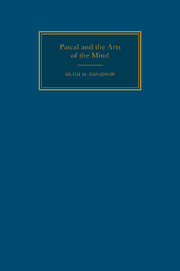Preface and acknowledgments
Published online by Cambridge University Press: 26 January 2010
Summary
The history and nature of the liberal or intellectual arts has interested me for several years; and in the course of my acquaintance with the works of Pascal I have come to see many traces, even explicit developments, testifying to the presence of these arts in his intellectual universe. And so I have undertaken in this exploratory essay to study in some detail the relation of certain ones of those basic arts to Pascal's thought and works.
My intention has been less to interpret his achievement in some novel way than to watch him at work, to describe his practice, and to see to what extent that working could be related to the more general topic with which I began. As a starting point, it has seemed to me that Pascal recurrently finds himself in or puts himself in situations where the problems, paradoxes, mysteries that he needs to treat arise under three main headings, having to do with (i) things and quantities, (2) creatures and their Creator, and (3) polemical or dialogic communications.
However, one sees not only recurrent problems but also reappearing lines of attack on them, tendencies that bespeak something conscious and deliberate. From that observation it is easy to reach the idea of intellectual habits, of arts of the mind. I say arts, and not sciences, because the tendencies in question, although they abound in theoretical implications, are in essence practical and productive. As a result of their presence and functioning they make a large contribution to the fact that certain realities with determinate characteristics – the works of Pascal – have come into existence.
- Type
- Chapter
- Information
- Pascal and the Arts of the Mind , pp. xiii - xviPublisher: Cambridge University PressPrint publication year: 1993

